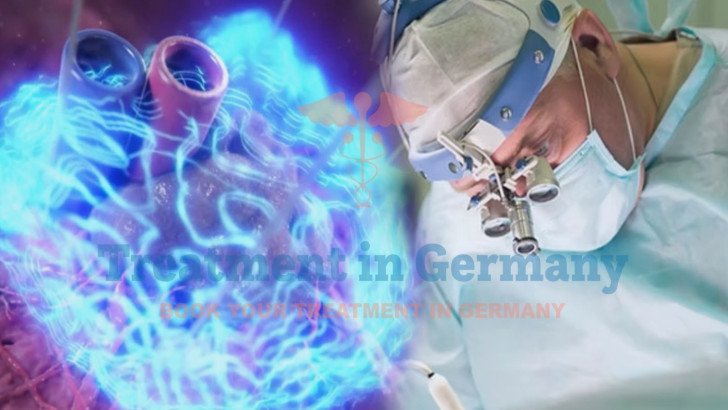
According to global cancer statistics, prostate cancer is the second most diagnosed cancer among men and ranks as the fifth leading cause of cancer-related deaths.
Prostate cancer, one of the most common cancers among men, requires innovative and effective treatment options to balance cancer control with quality of life. In Germany, cancer treatment has embraced NanoKnife therapy (Irreversible Electroporation, or IRE), a minimally invasive focal therapy that targets prostate tumors with precision. Delivered by expert, including German oncologists and urologists, in advanced hospitals, NanoKnife therapy integrates with targeted therapy, immunotherapy, and dendritic cell therapy to offer personalized care.
Prostate cancer originates in the prostate gland and ranges from localized, low-risk tumors to aggressive, metastatic disease. It affects approximately 1 in 8 men, with risk factors including obesity, diabetes, high cholesterol (hyperlipidemia), and autoimmune diseases. Localized prostate cancer has a 5-year survival rate of nearly 100%, but treatments like radical prostatectomy or radiotherapy can cause incontinence and erectile dysfunction.
NanoKnife therapy, an innovative cancer treatment, uses electrical pulses to destroy cancer cells while sparing surrounding structures, making it ideal for low- to intermediate-risk, localized prostate cancer (Gleason 3+4 or 4+3). Hospitals leverage latest research in cancer treatment to deliver NanoKnife prostate cancer treatment, improving quality of life after treatment..
Precise diagnosis is essential to determine eligibility for NanoKnife therapy. Doctors in Germany employ advanced diagnostics to confirm tumor location, size, and grade, ensuring suitability for focal therapy.
German oncologists in DKG-certified hospitals provide rapid, accurate assessments, enabling prompt initiation of innovative cancer treatments.
NanoKnife Prostate Cancer Treatment and Complementary Therapies in Germany
NanoKnife therapy is a focal ablation technique that targets prostate tumors while preserving healthy tissue. Hospitals integrate it with other therapies to optimize outcomes for prostate cancer.
NanoKnife Therapy (Irreversible Electroporation)
NanoKnife therapy uses high-voltage electrical pulses delivered through thin needles to create nanopores in cancer cell membranes, inducing apoptosis (programmed cell death). Performed under general anesthesia, it typically lasts 45-60 minutes as an outpatient procedure.
Complementary Systemic Therapies
To support NanoKnife therapy, doctors may combine it with:
Supportive Treatments
Pain Management: Analgesics or nerve blocks address post-procedure discomfort, though pain is minimal due to the non-thermal nature of NanoKnife therapy.
Clinical Trials and Emerging Therapies
Germany leads in innovative cancer treatments, offering trials for NanoKnife therapy combined with immunotherapy or novel targeted therapy. These trials, accessible in DKG-certified hospitals, advance cancer treatment options and refine focal therapy protocols.
Why NanoKnife Therapy Is Revolutionary for Prostate Cancer
Prostate cancer treatment requires balancing efficacy with quality of life. NanoKnife therapy excels because:
Hospitals achieve cancer-free status in 90% of intermediate-risk patients at one year, with 98% continence rates.
Benefits of NanoKnife Prostate Cancer Treatment in Germany
Germany’s cancer treatment options with NanoKnife therapy offer significant advantages
Side effects, like temporary hematuria or urinary irritation, are managed by doctors in Germany, ensuring comfort and quality of life after treatment in Germany.
Complementary Therapies Supporting NanoKnife Therapy
Complementary therapies enhance outcomes:
These are standard in hospitals, ensuring holistic cancer therapy in Germany.
Why Germany Leads in NanoKnife Prostate Cancer Treatment
Germany excels in cancer treatment due to:
Germany’s focal therapy outcomes surpass EU averages by 5-10%, reflecting its expertise in cancer therapy in Germany.
Conclusion
NanoKnife prostate cancer treatment is revolutionizing care in Germany, offering precise, minimally invasive ablation for localized prostate cancer. Complemented by targeted therapy, immunotherapy, and dendritic cell therapy, and delivered by expert German oncologists in DKG-certified hospitals, these cancer treatment options achieve high cancer control with minimal side effects, enhancing quality of life after treatment. With complementary therapies and trial access, Germany is a premier destination for NanoKnife therapy.
Frequently Asked Questions About NanoKnife Prostate Cancer Treatment in Germany
What is NanoKnife therapy for prostate cancer in Germany?
NanoKnife therapy uses electrical pulses to destroy prostate cancer cells, offering a minimally invasive option with high precision.
Who is eligible for NanoKnife prostate cancer treatment in Germany?
Patients with localized, low- to intermediate-risk prostate cancer (Gleason 3+4 or 4+3) are ideal candidates, assessed by doctors.
What are the side effects of NanoKnife therapy in Germany?
Side effects are minimal, including temporary urinary issues or hematuria, with low risk to quality of life after treatment.
How effective is NanoKnife therapy for prostate cancer in Germany?
NanoKnife therapy achieves 90% cancer-free status at one year for localized prostate cancer, per latest research in cancer treatment.
How long is recovery after NanoKnife prostate cancer treatment in Germany?
Recovery is rapid, with most patients resuming normal activities within days after NanoKnife therapy.
Can NanoKnife therapy be combined with other treatments in Germany?
Yes, NanoKnife therapy integrates with targeted therapy, immunotherapy, or dendritic cell therapy for comprehensive cancer therapy in Germany.
How experienced are German doctors with NanoKnife therapy?
German oncologists are global experts in innovative cancer treatments in Germany, including NanoKnife therapy.
Is NanoKnife therapy available for recurrent prostate cancer in Germany?
NanoKnife therapy is effective for salvage therapy in recurrent prostate cancer, preserving quality of life after treatment in Germany.
How does NanoKnife therapy compare to other prostate cancer treatments in Germany?
NanoKnife therapy offers superior preservation of urinary and erectile function compared to surgery or radiotherapy, per cancer treatment options in Germany.
Can I get a NanoKnife treatment plan before traveling to Germany?
Yes, facilities can provide personalized NanoKnife therapy plans for prostate cancer based on medical records.
For more information or a free consultation, visit our contact us page.
Kindly complete the form below, and our dedicated team will reach out to you promptly. We look forward to connecting with you soon!
Trierer Straße, 56072 Koblenz, Germany

.webp)
 (1).webp)

.webp)
 (1).webp)


.webp)
 (1).webp)

.webp)
 (1).webp)
